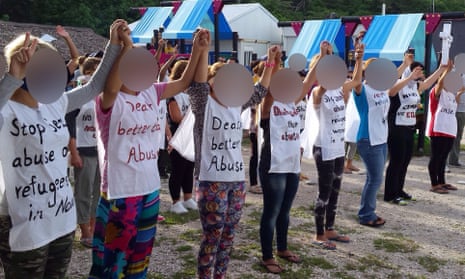Australia has “clear and undeniable” responsibility for the physical and psychological damage its illegal offshore detention regime has caused to asylum seekers and refugees, a senior UN official has said.
The UN’s special rapporteur on the human rights of migrants, François Crépeau, has reported on his visit to Australia last November, saying Australia’s strong human rights record was tarnished by an abusive offshore detention system that “cannot be salvaged”.
Crépeau said the regime of offshore detention – on Papua New Guinea’s Manus Island and the Pacific state of Nauru – was unjustifiably punitive and unlawful “cruel, inhuman and degrading treatment”. He said Australia knew the dangerous and helpless situations on Manus and Nauru were damaging those held there.
“Mental health issues are rife, with post-traumatic stress disorder, anxiety and depression being the most common ailments,” Crépeau wrote. “Many refugees and asylum seekers are on a constant diet of sleeping tablets and antidepressants. Children also show signs of mental distress … many adolescents are themselves already on antidepressants.”
Crépeau found that refugees and asylum seekers do not feel safe on Nauru. “Many of the migrants reported incidents of verbal abuse, physical attack or theft from the local community … Despite complaints to the local police, no one is being held accountable and, due to their lack of trust in the local police, incidents most often go unreported.
“The special rapporteur heard accounts of the rape and sexual abuse of female asylum seekers and refugees by security guards, by service providers, by refugees and asylum seekers or by Nauruans, and there is not a proper and independent investigation mechanism in place, making the life of women in the regional processing centres unbearable. Women and girls fear reporting such incidents to the Nauruan police and, even when they are reported, investigation or appropriate sanctions rarely ensue.”
Australia has consistently maintained that conditions in offshore detention centres are the responsibility of the governments on whose territory the centres are housed. Crépeau said full responsibility for the centres lies with Australia, which pays for, manages and has ultimate authority over the centres.
“Considering that this situation is purposely engineered by Australian authorities … and considering that Australian authorities have been alerted to such serious issues by numerous reports from international organisations such as the United Nations and civil society organisations, Australia’s responsibility for the physical and psychological damage suffered by these asylum seekers and refugees is clear and undeniable.”
Crépeau found the fact and nature of Australia’s offshore detention regime was illegal under international law.
“The forced offshore confinement (although not necessarily detention any more) in which asylum seekers and refugees are maintained constitutes cruel, inhuman and degrading treatment or punishment according to international human rights law standards. Australia would vehemently protest if such treatment were inflicted by any other state on Australian citizens, and in particular on Australian children.”
In his 21-page report, the special rapporteur also condemned the Australian government’s use of the term “illegal” to describe a person who sought asylum. He said the characterisation of people as illegal, when they had not committed a crime, was used to justify indefinite detention.
“While migrants who arrive in countries of destination without documents may be in an ‘irregular’ or ‘undocumented’ or ‘unauthorised’ situation, they have not committed a criminal act,” he said. “A human being cannot be intrinsically ‘illegal’ and naming anyone as such dehumanises that person. The conceptualisation of irregular migrants as ‘illegals’ has undoubtedly played into the criminalisation of migrants and thus into the use of immigration detention.”
Crépeau visited Australia before the announcement of the nascent US deal, under which America would agree to resettle refugees from Australia’s offshore detention centres. No refugees have yet been resettled under the deal but interviews and assessments are continuing on both islands.
The special rapporteur was complimentary about Australia’s “exemplary” formal refugee resettlement program, singling out the country’s additional intake of 12,000 refugees from the Syrian and Iraqi conflicts as a valuable and positive contribution to the global issue of forced displacement.
“The migration policies of Australia give many positive examples, such as the country’s resettlement program, granting humanitarian protection to a high number of refugees with the objective of increasing the number of visas issued to 18,750 per year from 2018, and assisting them in their integration process with generous and well thought through integration programs.”
The Australian government, in a formal response, rejected Crépeau’s report, saying the special rapporteur had made errors in his findings.
Government officials told Crépeau that Australia’s strong border protection policies enabled it to make a “generous contribution to global humanitarian resettlement efforts”.
“Australia takes its international obligations seriously. Immigration detention is an important part of strong border control and supports Australia’s migration system.
“It assists in managing potential risks to the Australian community – including national security, health and character risks – and ensures people are available for removal.”
Australia said health services in offshore detention were provided by private contractors to the Australian government and had been improved.
“The department has implemented an enhanced mental health strategy in Nauru to improve the provision of mental health services to transferees and refugees.”
The office of the special rapporteur on human rights of migrants is a subsidiary body of the human rights council, the powerful UN body to which Australia is seeking election at the end of this year.
Australia is competing against Spain and France for two positions on the council. Elections will take place in November.
While Australia is regarded as a solid chance to be elected to the council, the damaging report from the special rapporteur will weaken its position.
